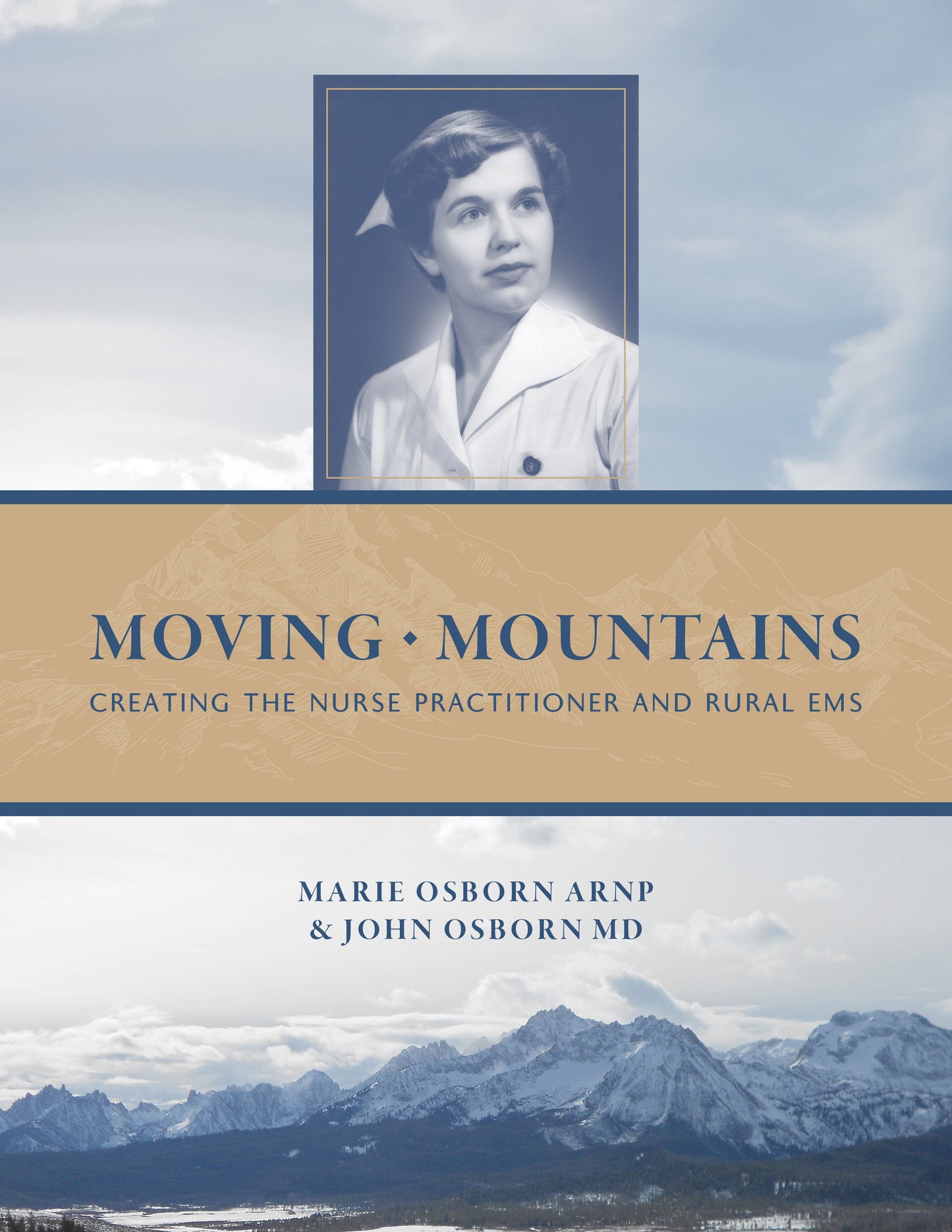Caxton Press
Moving Mountains - Creating the Nurse Practitioner and Rural EMS
Moving Mountains - Creating the Nurse Practitioner and Rural EMS
Couldn't load pickup availability
By: Marie Osborn ARNP & John Osborn MD
This is a Creation Story of The Nurse Practioner and Rural EMS
Move over TV medical dramas! Moving Mountains is the real-life story of Idaho’s first nurse practitioner, Marie Osborn. In 1971, Marie founded an emergency clinic in rugged Sawtooth-Salmon River country, covering 6,000 square miles on 24/7 call.
Moving Mountains tracks development of rural medicine, emergency services, and breaking the glass ceiling of male-dominated medicine. Time and again Marie survived conflicts with professional boards, legislatures, the insurance industry, and bitter Idaho winters – all at significant personal cost.
For those interested in the origins of Nurse Practitioners, and to understand contemporary rural medicine issues, this heartwarming memoir breaks a trail so others may follow.
Available for Pre-Order January 20, 2025
-
- Item # 046568
- Dimensions 8.5 x 11 inches (portrait)
- Manufacturer: Caxton Press
- ISBN# 978-087004-656-8
- Price: $29.95
- Sale Price: $ 25.46
- You Save: $ 4.49 (15%)
Share


Excellent book. Informative and inspiring.
I received my copy of Moving Mountains this week and I am absolutely gobsmacked. I can't begin to find the words to describe my response. This is SO much more than the story of one woman—although it wouldn't be a story without her at the center of it. I expected to learn about a pioneering NP, but I didn't expect to enter this whole world of people in a small mountain community, and the woman who was the anchor that held them together and changed their lives.
I don't know when I have read a book that has moved me this much, and I haven't finished it yet. Of course, I started by picking it up and leafing through it, and then reading personal stories, and then sat down and started at the beginning. In a very busy week, I have had a hard time putting it down—reading it during my commute, staying up too late when I had an early morning and telling friends and family about these amazing people who I have gotten to know. Some of the stories moved me to tears . . . really. The toddler who was running across the road to her mother, the man who raped her and threatened to kill Mousse, the young sisters found in their ice cave close to death after the rescue team put their own lives in danger . . . on and on and on.
The stories of the emergencies she and the community responded to are both heart wrenching and heartwarming. Marie's relief when a life is saved and her reflections when a life was lost are conveyed so beautifully in the writing. She connected so strongly with the families, especially the women and the children (and the dogs and goats!). And the personal stories of how her commitment to this work affected and influenced her family were so very moving and real. Marie’s daughter and ER nurse writing about working in New York City during the peak of COVID should be required reading for anyone who dismisses the seriousness of that pandemic and its impact on our healthcare workers.
I have learned so much about the everyday heroism of Forest Service workers, the hard political activism and persistence needed to bring EMS to rural areas, the barriers to providing the needed resources to NPs working in underserved areas, the challenges faced by a lone woman whose skill and determination were dismissed by male medical doctors in the state while others supported by her. I laughed when I read that Marie, as a student nurse in the early 1950s, was expected to stand when the (male) doctor entered the room.
All of this is especially poignant now when rural healthcare, EMS, the Forest Service and other critical first-responder and health resources for rural America face Draconian cuts.
I could go on and on, but I don't need to. It truly could be an award-winning TV series. It certainly deserves a wider readership. I felt an affinity with Maire having grown up in Tennessee dreaming about the Frontier Nursing Service, and having received my FNP education at Ball State University in Indiana.
I too am the daughter of a nurse, one of those strong women of that generation. The daughter of Swedish immigrants, she was on her own with her brother in NYC at age 12 when their mother died and their father abandoned them. An Army nurse in WWII, in the mountains of Burma for 2 1/2 years, caring for Merrill's Marauders when they emerged from the jungles, going to work in the housing projects in Chattanooga as a public health nurse when my father was diagnosed with early onset Alzheimer's when he was 51. Her brain tumor was diagnosed the same month he died. My mother working in healthcare was another "tough cookie." So, a huge thank you to this book for honoring our mothers and women in healthcare.
A huge thank you for this book. It is a treasure. I can't wait to get back to it now, finish it, and tell my nursing friends about it—and my medical friends who have worked in community health and underserved areas.
And please, please, give my highest regards to Marie, and tell her how very much her story has moved me! I would have loved to have met her and worked with her in the mountains of Idaho.


